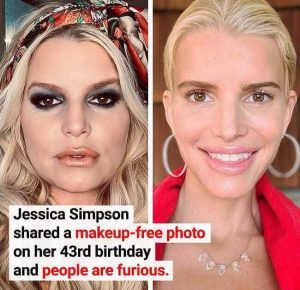Jessica Simpson is a well-known influencer who has made a significant impact on thousands of people for many years. While there are countless influencers worldwide, Jessica Simpson stands out among them due to her authenticity and relatability.
Recently, Jessica Simpson, who just turned 43, surprised her fans by posting a makeup-free selfie on social media in celebration of her birthday. However, her decision to go natural received mixed reactions from her followers.

In her post, she wrote: “43 makeup free (kinda. Ha. I did curl my lashes.)”
In the photo, Simpson appears radiant, her smile wide and genuine. Her blonde hair cascades elegantly, and her overall appearance exudes confidence and style. She accessorized with some sparkling jewelry that complemented her natural beauty. Despite the positive nature of her post, not all the comments she received were encouraging. Some followers praised her for her confidence and asked about her skincare routine, suggesting that her flawless complexion didn’t need makeup in the first place.
However, others questioned the authenticity of her claim to be makeup-free. Several individuals pointed out that she appeared to be wearing lip gloss, mascara, and concealer, suggesting that her look was not entirely natural. These comments sparked a debate among her followers, with some accusing her of being misleading. One fan mentioned that while Simpson seemed kind-hearted, it was evident she had mascara on her lashes, which they believed contradicted the makeup-free claim. They argued that promoting such an image could set unrealistic standards and be irresponsible, especially for younger audiences who look up to her.
This incident reignited discussions about beauty standards and authenticity on social media. Jessica Simpson has been open about her struggles with societal pressures and the expectations placed on women, particularly in the public eye. In a recent interview, she shared her concerns about raising her daughters in an era dominated by social media. She admitted that there were times when she felt compelled to post photos because of societal pressure, even when she didn’t genuinely want to. This realization led her to reflect on how these choices might influence her daughters’ perceptions of beauty and self-worth.
Simpson revealed that after taking certain photos, she would sometimes edit them or apply filters to enhance her appearance. However, she began questioning whether these actions aligned with the values she wanted to instill in her children. The pressure to present a flawless image online made her reconsider the message she was sending. She emphasized the importance of teaching her daughters to embrace their natural beauty and feel confident in their own skin, regardless of societal expectations.
The discussion surrounding Simpson’s post is part of a broader conversation about the use of makeup and photo editing in today’s digital age. Many celebrities and influencers are known for heavily modifying their images or wearing extensive makeup to maintain a polished appearance. This practice has led to unrealistic beauty standards that can negatively impact people’s self-esteem, particularly young women and girls who compare themselves to these idealized images.
On the other hand, a growing number of public figures are embracing a more natural look, choosing to forgo makeup and share unedited photos. This shift toward authenticity is seen as empowering and inspiring, as it encourages people to appreciate their unique features and feel comfortable in their own skin. By showcasing their natural appearance, these individuals help challenge conventional beauty standards and promote a healthier, more inclusive definition of beauty.
Jessica Simpson’s decision to share a makeup-free selfie aligns with this movement toward authenticity. Despite the mixed reactions, her post resonated with many people who appreciated her vulnerability and confidence. By acknowledging that she had curled her lashes, she demonstrated honesty while still embracing her natural beauty. Her willingness to present herself without the layers of makeup often seen on social media serves as a reminder that beauty is not defined by perfection.
The conversation sparked by Simpson’s post highlights the complexities of navigating social media in today’s world. While platforms like Instagram and Facebook offer opportunities for self-expression and connection, they also create pressure to conform to certain beauty ideals. The curated nature of social media can make it difficult for individuals to differentiate between reality and the carefully constructed images they see online.
Simpson’s openness about her experiences with these pressures is particularly important because it sheds light on the challenges faced by women of all ages. Her candidness serves as a reminder that even those in the spotlight are not immune to self-doubt and societal expectations. By sharing her journey, she offers reassurance to others who may be struggling with similar feelings, encouraging them to prioritize self-acceptance and authenticity.
Moreover, the discussion surrounding her post underscores the importance of promoting realistic representations of beauty. While makeup can be a fun and creative form of self-expression, it should not be seen as a necessity for feeling confident or attractive. By celebrating natural beauty and embracing imperfections, individuals can foster a more positive self-image and inspire others to do the same.
In the end, Jessica Simpson’s birthday selfie serves as a powerful reminder that beauty comes in many forms. Whether with or without makeup, her radiant smile and genuine spirit shine through, leaving a lasting impression on her fans. Her willingness to be vulnerable in the face of criticism demonstrates strength and resilience, qualities that are truly inspiring.
As the conversation about beauty standards continues to evolve, Simpson’s post stands as a testament to the importance of authenticity and self-love. By embracing her natural appearance and sharing her journey with the world, she encourages others to do the same, helping to create a more inclusive and compassionate society where everyone feels confident and valued just as they are.





